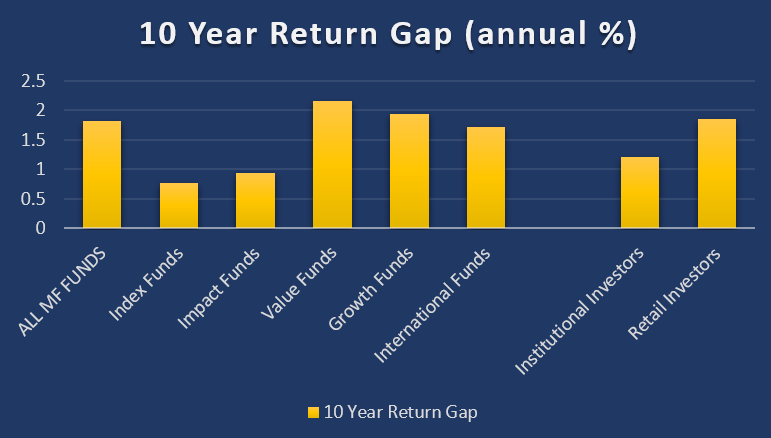
There’s been plenty of research in recent years, and rightly so, on the performance of sustainable, or ESG, funds.
More and more people are choosing to invest in a way that reflects their personal values, and it’s fair to say the jury’s still out on whether they pay any penalty in terms of performance. The growing consensus now is that the long-term returns these funds deliver are broadly in line with those of mainstream funds with similar fees and charges.
What about behaviour?
But another question that warrants more research is, How do sustainable investors behave? As research by the likes of Dalbar and Morningstar regularly reveals, there is a significant gap between the returns that funds produce and the returns that investors in those funds actually receive.
This so-called behaviour gap can be huge. Morningstar’s 2014 Mind the Gap study, for example, showed that over the previous ten year-period, investor returns were, on average, 2.49% lower than fund returns. The gap is largely attributable to market timing, and particularly the tendency of investors to take fright when markets fall.
So, does investing with your conscience make you more likely to ignore market volatility and stay the course? Initial research suggests that indeed it does.
Centered Wealth, a financial advice firm based in Minneapolis, partnered with Derek Horstmeyer, Assistant Professor of Finance at the School of Business, George Mason University, to study the numbers.
Using investor data from Morningstar for the ten-ear period ending in 2017, Horstmeyer compared the return gap on 864 US-domiciled funds with an environmental, socially responsible or impact focus, to the gap reported by mainstream funds. On average, he discovered, the gap for the former was 1.23% smaller than it was for the latter.
More resilient investors
Interviewed for Financial Advisor Magazine, Jina Penn-Tracy, co-founder of Centered Wealth, said: “What we’re seeing is that if you incorporate clients’ values and what they care about into the investment process, they see their investments as an expression of those values. They react less to external market triggers and become more resilient investors.”
In her view, Penn-Tracy tells the magazine, that 1.23% uplift in returns enjoyed by sustainable investors is largely down to three behavioural biases:
Herd behaviour: It’s a natural human instinct to mimic the actions of others. Investors want to ensure that they’re not missing out on the returns that other investors are receiving. But because sustainable investors are generally more intrinsically motivated, they tend to focus on issues that matter to them, and not just financial performance.
Loss aversion: Investors typically dislike losses far more than they like making gains. But sustainable investors are focused on more fundamental losses than purely financial ones. They might fear the loss of the ecosystem, or a species of animal, for example. That, Penn-Tracy argues, makes them more likely to stay invested in a market downturn.
Recency bias: Investors often attach more importance than they should to recent events. This is usually seen as a negative thing, but for sustainable investors it’s also a positive. For example, when Donald Trump was elected President in November 2016, commentators expected markets to fall. But, amid fears (well-founded, as it turned out) that the US would withdraw from the Paris Climate Agreement, sustainable funds saw large net inflows over the next few weeks.
Passive investors behave best
One other point to mention about Derek Horstmeyer’s research: the only group who were better behaved than sustainable investors were passive investors. As the chart below illustrates, it was investors in value funds who were the most likely to capitulate when markets fell.

Chart from Centered Wealth, Minneapolis
This, of course, is just one study, and much more research is needed. But the findings are certainly encouraging. Investors who look at the bigger picture and base their investment decisions on other factors than just the financial might, ironically, end up earning higher returns.
Paul Ellis’s interview with Jina Penn-Tracy for Financial Advisor is well worth reading in full:
How sustainable and impact investing can increase investor resilience and decrease the performance gap
Free sustainable investing event in Leeds, England, 9th July 2019
UK-based adviser, investment consultant or fund trustee? Want to learn more about ESG and impact investing? We’re helping to run a free one-day event in Leeds on Tuesday 9th July to highlight the latest developments in this increasingly important sector.
For more information and to register, follow this link:
The Values-Based Adviser, Elland Road Stadium, Tuesday 9th July









